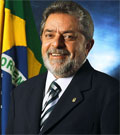Lula remains strong amidst global finance crisis
 Buenos Aires - Brazilian President Luiz Inacio Lula da Silva will most likely find that 2008 has been generally a good year for him. For one thing, December found him with a record popularity rating.
Buenos Aires - Brazilian President Luiz Inacio Lula da Silva will most likely find that 2008 has been generally a good year for him. For one thing, December found him with a record popularity rating.
Some 70 per cent of Brazilians thought that the leftist Lula - who took office on January 1, 2003 as the first president of working- class origin in Brazilian history - was doing an "excellent" or a "good" job, the highest rating of any president since Brazil's democratization in 1985.
Such popularity is bound to come in handy as Lula tackles the challenges of 2009, complete with a severe economic crisis affecting Brazil's export markets that has pushed down the prices of export commodities.
Over the course of his presidency, Lula has managed to reduce Brazil's foreign debt, decrease unemployment, and maintain growth, while leading a major transfer of wealth through programmes like the now-famous Bolsa Familia (family fund) anti-poverty scheme.
Some 44 million Brazilians among the country's population of some 196 million currently benefit from the Bolsa Familia, for one, and it remains to be seen whether Lula can continue to improve, through this programme and others, the lot of the country's poor as the world economy falls.
So far, however, even the crisis has brought some good news for Lula.
Brazil, like other emerging economies, has so far escaped the heavy scourge of the global slump, with growth still in the positive range if somewhat less than years past, even as more industrialized economies slip into recession.
Another upside of the crisis was the confirmation of the importance of emerging economies in November, when Brazil, India, China and other countries joined European countries, Japan, the US and Canada at the hastily-organized global crisis summit in Washington.
Lula, president of the so-called G20, sat next to US President George Bush at the White House dinner that weekend, which marked the first time the G20 ever came together at the summit level.
As he departed Washington after the talks, Lula said: "This is a historic day. I leave with the certainty that the political geography of the world has been given a new dimension."
Two months earlier, with the Brazilian economy still on very firm ground, Lula sounded a more arrogant tone about the crisis.
"The emerging countries which have done everything right should not now become victims of the casino that (the bankers) set up in the United States," Lula said at one point.
"People ask me about the crisis, and I answer, go ask (US President George W) Bush. It is his crisis, not mine. I have to look after my country so that it is not affected," he said at another point.
But it soon became apparent that Brazil, like the rest of the world, would hardly escape the effects of the slump. Commodity prices fell, as did the sale of cars and other Brazilian industrial products at home and abroad.
The country's economic growth prospects for 2009 were reduced to just 2.8 per cent. Over the past year, the Brazilian real depreciated by over 30 per cent against the US dollar, while the Bovespa index at the Sao Paulo stock exchange fell by some 47 per cent since May.
Lula knows that his people have less leeway in their living standards and stand to lose more basic elements when things get tough than their counterparts in industrialized nations.
By late 2008, he had introduced tax cuts and other measures to lessen the burden of the downturn. Internal demand is key when bigger foreign markets lose steam.
"Thousands of millions of human beings, particularly the most vulnerable, expect us to rise to the level of the challenges. We cannot fail, we must not, we do not have the right to fail," he noted.
As Lula faces the challenge, he can gloat over at least one gain for 2008: as the price of oil has fallen, so have the regional prospects of his erstwhile rival for Latin American leadership, Venezuelan President Hugo Chavez.
Lula has built his success on a three-pronged strategy. He has provided for the millions of poor who are his main constituency; solidified his clear leadership within Latin America; and garnered greater prominence in the global arena not only on the finance crisis, but also on issues of global warming and trade.
It remained to be seen how much of that he could salvage amidst the economic crisis, and how many of his accomplishments will actually outlive him to become part of Brazil's long-term heritage.
Lula ousted a centre-right government in Brazil, rising from life as a metalworker in the metropolis of Sao Paulo to a globally- respected statesman. His second term ends in early 2011, and the leading candidate to replace him at present is opposition leader Jose Serra, of the centre-right Party of Brazilian Social Democracy.
The Brazilian constitution does not allow a third presidential term, and the incumbent has expressed no intention of seeking changes in that rule. That, in the end, is another sign of the vibrancy of Brazil's democracy. (dpa)